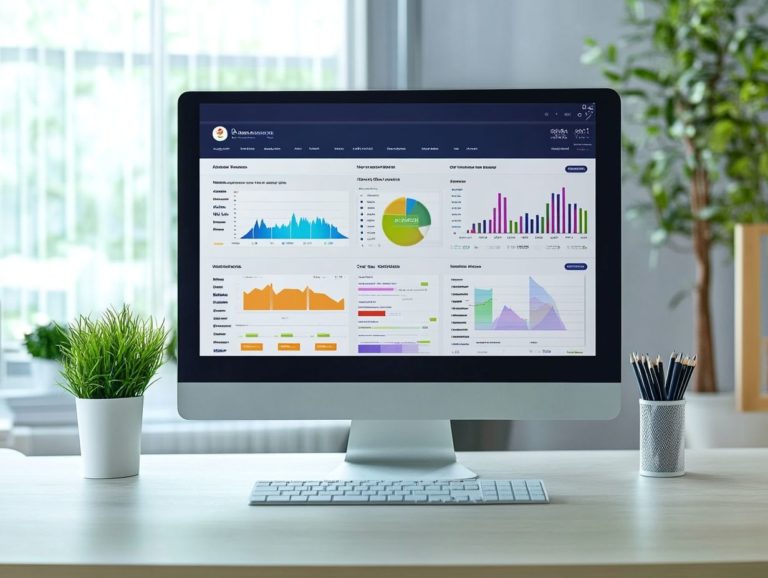How to Measure CRM Software Effectiveness?
In today s fiercely competitive landscape, the importance of CRM software cannot be overstated for achieving business success. Get ready to unlock the full potential of your CRM software!
This article explores the key metrics that make a CRM system effective. You ll learn how to gauge customer satisfaction through insightful surveys, assess sales performance by meticulously tracking conversion rates, and evaluate customer retention by scrutinizing churn rates.
You will also explore cost efficiency by calculating Return on Investment (ROI), which helps you understand the value of your CRM spending, and leveraging CRM analytics to transform data into strategic decision-making. Uncover essential tools and techniques that will empower you to maximize your CRM investment.
Contents
- Key Takeaways:
- Understanding CRM Software Effectiveness
- Measuring Customer Satisfaction
- Assessing Sales Performance
- Analyzing Customer Retention
- Evaluating Cost Efficiency
- Utilizing CRM Analytics
- Frequently Asked Questions
- What is CRM software effectiveness, and why is it important to measure?
- What are some key metrics to consider when measuring CRM software effectiveness?
- How can data analysis help in measuring CRM software effectiveness?
- What are some common challenges in measuring CRM software effectiveness?
- How often should CRM software effectiveness be measured?
- How can the results of measuring CRM software effectiveness be used to improve the system?
Key Takeaways:

Don’t wait! Start tracking these metrics today for a successful CRM strategy! Regularly track and analyze key metrics such as customer satisfaction, sales performance, and customer retention to measure the effectiveness of your CRM software.
Use surveys, feedback, and data analysis to obtain insights on customer satisfaction and retention. Track conversion rates and sales growth to assess the impact of your CRM software on sales performance.
Evaluate the cost efficiency of your CRM software by calculating ROI and cost per acquisition. Utilize CRM analytics to gain deeper insights into customer behavior and the effectiveness of your CRM strategies.
Understanding CRM Software Effectiveness
Understanding the effectiveness of CRM software is essential for optimizing your sales process, enhancing customer journey mapping, and measuring ROI after CRM implementation to improve the overall customer experience.
By leveraging advanced CRM implementation strategies, you can streamline your sales cycle, efficiently manage your sales pipeline, and tap into the power of customer databases to drive greater engagement.
Using automated alerts can help facilitate timely interventions, empowering your sales reps to achieve their business goals with precision and confidence.
Defining Key Metrics
Defining key metrics is crucial for measuring the success of your CRM software. This enables you to link sales metrics with marketing metrics, helping you understand your close rate and customer lifetime value.
By carefully analyzing these metrics, you can make data-driven decisions that will directly influence your growth and profitability. For example, identifying a clear correlation between your marketing activities and sales performance empowers you to allocate resources more effectively, optimizing the efforts of both teams to drive conversions.
Establishing an ideal customer profile allows you to tailor your outreach and engagement strategies, ensuring you attract and retain the most valuable clients. Additionally, incorporating lead scoring into this process significantly enhances the effectiveness of your CRM analytics.
This prioritization of high-potential leads not only improves conversion rates but also boosts customer retention over the long term.
Measuring Customer Satisfaction
Measuring customer satisfaction through systematic approaches, such as surveys and feedback mechanisms, provides you with invaluable insights into the customer experience.
This allows you to gauge your Net Promoter Score and achieve first contact resolution with remarkable effectiveness.
Using Surveys and Feedback
Using surveys and feedback effectively can significantly enhance your customer satisfaction by capturing essential data that reflects the quality of your customer service and provides valuable insights into customer preferences and needs.
There are various types of surveys at your disposal, including online questionnaires, telephone interviews, and focus groups, each tailored to serve unique purposes.
The types of questions you choose can vary widely from Likert scales that gauge levels of agreement to open-ended questions that invite rich, detailed responses.
These feedback mechanisms not only provide data on service quality but also illuminate areas ripe for improvement, enabling you to tailor your offerings to better meet customer expectations.
Methods like the Net Promoter Score (NPS) offer you a quick snapshot of customer loyalty, while customer satisfaction scores (CSAT) give you immediate feedback on specific interactions.
By systematically analyzing this data, you can gain a deeper understanding of your customers, fostering stronger relationships and ultimately elevating the overall customer experience.
Assessing Sales Performance

Assessing your sales performance is essential for uncovering trends and making well-informed decisions.
This process involves meticulously tracking key sales metrics, including conversion rates and overall sales growth achieved by your team. Such insights give you the power to optimize strategies and drive your success forward.
Tracking Conversion Rates and Sales Growth
Tracking conversion rates and sales growth provides you with essential insights into the effectiveness of your sales strategies. This offers a clear picture of customer acquisition costs and overall revenue generation.
By closely monitoring these metrics, you can pinpoint which approaches resonate best with your audience. This enables you to fine-tune your sales tactics.
This data-driven analysis is especially valuable if you re utilizing CRM software, as it allows you to analyze patterns and adjust your outreach methods in real-time.
Over time, these optimizations enhance customer experiences and lead to more significant revenue outcomes. Understanding the dynamics of conversion rates gives you the power to allocate resources efficiently, ultimately driving long-term growth and sustained success in a competitive market.
Analyzing Customer Retention
Analyzing customer retention is essential for grasping churn rates and encouraging repeat business. This focus not only boosts the overall customer lifetime value but also elevates the retention rate of your organization.
By prioritizing this analysis, you can gain valuable insights that lead to lasting customer relationships and sustained success.
Examining Churn Rates and Repeat Business
Examining churn rates is crucial for uncovering patterns in customer behavior and enhancing repeat business. Both of these are vital for long-term customer retention and an overall exceptional customer experience.
By understanding why customers leave, you gain invaluable insights into their needs and expectations. This gives you the power to adapt your strategies effectively.
Several factors contribute to churn, such as inadequate customer service, lack of engagement, and uncompetitive pricing. Addressing these issues is vital for improving customer retention.
By leveraging CRM analytics, you can unveil hidden trends and preferences. This allows you to customize your approaches for specific segments.
Analyzing recurring behaviors enables you to implement targeted retention strategies, fostering loyalty and encouraging repeat transactions.
This strategy not only boosts your bottom line but also delights your customers!
Evaluating Cost Efficiency
Evaluating cost efficiency is essential for you as a business owner to assess the return on investment (ROI) from your CRM software. This evaluation is particularly crucial when you consider customer acquisition costs and the overall revenue generation your software can facilitate.
Calculating ROI and Cost Per Acquisition

Calculating ROI and cost per acquisition is crucial for evaluating the effectiveness of your sales strategies and understanding their impact on revenue throughout the customer lifetime.
By systematically assessing these metrics, you can uncover valuable insights into how well your investments are translating into profits and customer engagement.
The process starts with gathering data on your total marketing expenditures and comparing it to the revenue generated. This allows you to identify the acquisition costs tied to new customers.
When you analyze the relationship between these metrics, you see how each investment attracts new customers and contributes to your long-term profitability.
By keeping an eye on variations in ROI and cost per acquisition, you can make informed decisions that optimize your sales efforts and drive overall growth.
Utilizing CRM Analytics
By leveraging CRM analytics effectively, you can transform data capture into actionable insights, significantly enhancing your sales metrics.
This approach enables you to optimize the customer journey through precise lead scoring, ensuring that every interaction is meaningful and impactful.
Using Data to Measure Effectiveness
Using data to measure effectiveness is essential for evaluating CRM software performance. It offers valuable insights into customer metrics and enables the implementation of automated alerts for timely actions, including understanding how to track ROI from CRM software.
By analyzing various customer interaction metrics, you can identify patterns that indicate how well the CRM meets user needs and expectations. These insights may include customer engagement levels, satisfaction ratings, and feedback on service interactions.
Automated alerts can highlight trends that need immediate attention, such as a sudden drop in engagement or a surge in customer complaints. This enables your team to act quickly.
This approach gives you the knowledge to refine CRM strategies, ensuring the software enhances customer experiences and aligns with your overall business objectives.
Frequently Asked Questions
What is CRM software effectiveness, and why is it important to measure?
CRM software effectiveness refers to how well a CRM system meets its intended goals and objectives. For businesses looking to optimize their CRM usage, understanding how to measure CRM success is crucial as it helps assess the impact of the software on a company’s sales, customer relationships, and overall business growth.
What are some key metrics to consider when measuring CRM software effectiveness?

- Customer satisfaction
- Sales revenue
- Customer retention rates
- Lead conversion rates (the percentage of leads that turn into customers)
These metrics can help determine if the CRM software delivers positive results for the company.
How can data analysis help in measuring CRM software effectiveness?
Data analysis is a crucial tool for measuring CRM software effectiveness. Analyzing customer data and interactions provides insights into the performance of the CRM system and highlights areas for necessary improvements.
What are some common challenges in measuring CRM software effectiveness?
Common challenges include a lack of clear goals and objectives, inadequate data and measurement tools, and difficulty tying CRM results to overall business outcomes. Addressing these challenges is essential for accurately measuring effectiveness.
How often should CRM software effectiveness be measured?
CRM software effectiveness should be measured regularly, preferably monthly or quarterly. This frequency allows for tracking progress over time and identifying issues or areas for improvement, including understanding key metrics in CRM that may arise.
How can the results of measuring CRM software effectiveness be used to improve the system?
The results provide valuable insights into which areas of the system are working well and which need improvement. This information can be used to make necessary changes and enhancements to the CRM system, ultimately leading to better overall effectiveness.
Ready to assess your own CRM software effectiveness? Start tracking your metrics today!






